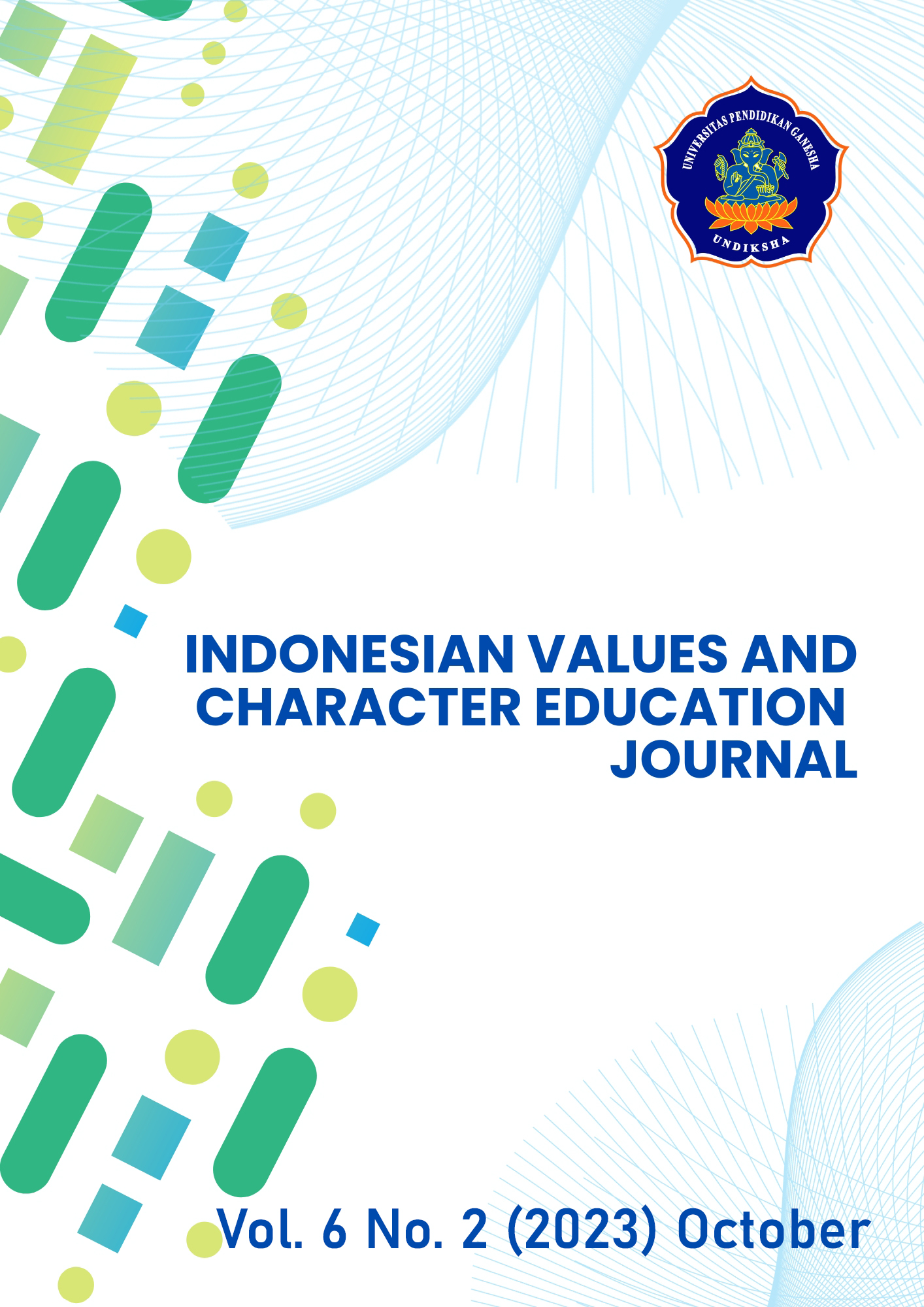Strengthening Character Education Modules for Teachers to Improve the Work Character of Vocational High School Students
DOI:
https://doi.org/10.23887/ivcej.v6i2.67318Keywords:
Strengthening character education, Character, Work Character, Vocational educationAbstract
One of the objectives of national education is to prepare character education activities in the form of forming character and character for the next generation of the nation. At the vocational high school level, it does not only focus on building good character but also the character needed in the world of work. This study aims to develop a work character-based Strengthening Character Education program module that can improve the work character of vocational high school students. The type of research conducted is research and development (Research and Development) using the integration of the ADDIE model with Borg and Gall. Data collection techniques used are documentation studies, questionnaires, and interviews. Analysis of research and development data results using mixed methods with a concurrent mixed methods. Qualitative data analysis used the Miles and Huberman model while quantitative data analysis used quantitative descriptive techniques with percentages and mean. This research resulted in a work character-based strengthening character education module in Vocational High Schools. Based on field trials, it shows that the strengthening character education module is based on work character, with the trial results having a score of 85% in the valid category and can be used without revision. It is hoped that SMK teachers can utilize the module in implementing strengthening character education so that they can improve the quality of graduates, especially work character.
References
Agustina, R., Kamdi, W., Hadi, S., Muladi, & Nurhadi, D. (2020). Influence of the principal’s digital leadership on the reflective practices of vocational teachers mediated by trust, self efficacy, and work engagement. International Journal of Learning, Teaching and Educational Research, 19(11), 24–40. https://doi.org/10.26803/ijlter.19.11.2. DOI: https://doi.org/10.26803/ijlter.19.11.2
Ajmain, & Marzuki. (2019). Peran Guru dan Kepala Sekolah dalam Pendidikan Karakter Siswa di SMA Negeri 3 Yogyakarta. SOCIA: Jurnal Ilmu-Ilmu Sosial, 16(1), 109–123. https://doi.org/10.21831/socia.v16i1.27655. DOI: https://doi.org/10.21831/socia.v16i1.27655
Amalia, S., & Wuryandani, W. (2020). Socio-Cultural Based Learning Module for Critical Thinking Ability in Elementary School: Systematic Search. Acta Educationis Generalis, 10(2), 180–187. https://doi.org/10.2478/atd-2020-0017. DOI: https://doi.org/10.2478/atd-2020-0017
Aningsih, Zulela, M. S., Neolaka, A., Iasha, V., & Setiawan, B. (2022). How is the Education Character Implemented? The Case Study in Indonesian Elementary School. Journal of Educational and Social Research, 12(1), 371–380. https://doi.org/10.36941/jesr-2022-0029. DOI: https://doi.org/10.36941/jesr-2022-0029
Apriyansa, A. (2017). Pengembangan Pendidikan Karakter di Sekolah Kejuruan. Prosiding Seminar Nasional Pendidikan Vokasional (SNPV), 108–112. https://www.researchgate.net/profile/ari-apriyansa/publication/324386261.
Creswell, J. (2008). Research design, qualitative, quantitative, and mixed methods approaches (third ed.). In California: Sage Publication. Sage Publication.
Dalyono, B., & Lestariningsih, E. D. (2017). Implementasi penguatan pendidikan karakter di sekolah. Bangun Rekaprima, 3(3), 33–42. https://doi.org/10.32497/bangunrekaprima.v3i2,%20Oktober.865.
Dalyono, Bambang, & Lestariningsih, E. D. (2020). Implementasi penguatan pendidikan karakter di sekolah [Implementation of strengthening character education in schools]. Bangun Rekaprima, 3(2), 33–42. https://doi.org/10.26858/pir.v3i2.14971. DOI: https://doi.org/10.32497/bangunrekaprima.v3i2.865
Elmahdi, I., Al-Hattami, A., & Fawzi, H. (2018). Using Technology for Formative Assessment to Improve Students’ Learning. Turkish Online Journal of Educational Technology-TOJET, 17(2), 182–188. https://eric.ed.gov/?id=EJ1176157.
Griffiths, M. (2002). The educational benefits of video games. Education and Health, 20(3), 47–51. https://doi.org/https://www.researchgate.net/publication/284491180.
Guiamalon, T. S., Alon, S. A. S., & Camsa, S. U. (2021). Teachers Issues and Concerns on the use of Modular Learning Modality. IJASOS- International E-Journal of Advances in Social Sciences, VII(20), 457–469. https://doi.org/10.18769/ijasos.970927. DOI: https://doi.org/10.18769/ijasos.970927
Gupta, T., Burke, K. A., & Greenbowe, T. J. (2022). Shifting the ownership of learning from instructor to students through student-led instructor-facilitated guided-inquiry learning. In Teaching Innovation in University Education: Case Studies and Main Practices, 69–98. https://doi.org/10.4018/978-1-6684-4441. DOI: https://doi.org/10.4018/978-1-6684-4441-2.ch005
Jaedun, A., Purwaningsih, E., Novita, F., & Alwan Wiranata, M. (2012). Implementasi Pendidikan Karakter Terintegrasi Dalam Kegiatan Pembelajaran Pada SMK Jurusan Bangunan di Daerah Istimewa Yogyakarta. Jurnal Pendidikan Teknologi Dan Kejuruan, 21(1). https://doi.org/10.21831/jptk.v21i1.3342.
Made, I., Dharma, A., Ayu, N., & Lestari, P. (2022). The Impact of Problem-based Learning Models on Social Studies Learning Outcomes and Critical Thinking Skills for Fifth Grade Elementary School Students. Jurnal Ilmiah Sekolah Dasar, 6(2), 263–269. https://doi.org/10.23887/JISD.V6I2.46140. DOI: https://doi.org/10.23887/jisd.v6i2.46140
Maisaro, A., Wiyono, B. B., & Arifin, I. (2018). Manajemen Program Penguatan Pendidikan Karakter di Sekolah Dasar. Jurnal Administrasi Dan Manajemen Pendidikan, 1(3), 302–312. https://doi.org/10.17977/um027v1i32018p302. DOI: https://doi.org/10.17977/um027v1i32018p302
Maunah, B. (2015). Implementasi Pendidikan Karakter dalam Pembentukan Kepribadian Holistik Siswa. Jurnal Pendidikan Karakter, 1. https://doi.org/10.21831/jpk.v0i1.8615. DOI: https://doi.org/10.21831/jpk.v0i1.8615
Meishanti, O. P. Y., & Maknun, M. J. (2021). Pengembangan E-Modul Berbasis Stem (Science Technologi Engineering and Mathematic) Materi Sistem Pernapasan. Eduscope, 7(1), 44–48. https://doi.org/10.32764/eduscope.v7i1.1964. DOI: https://doi.org/10.32764/eduscope.v7i2.2780
Melasi, N. M. (2018). Pengelolaan Pendidikan Karakter Pada Kegiatan Praktik Kerja Industri di SMK Negeri 1 Gondang. Jurnal Manajemen Pendidikan, 13(1). https://doi.org/10.23917/jmp.v13i2.6394. DOI: https://doi.org/10.23917/jmp.v13i2.6394
Miles, M. B., Michael Huberman, A., & Saldaña, J. (2014). Qualitative data analysis: A methods Sourcebook (3rd Edition). In SAGE Publications, Inc. https://doi.org/10.1177/239700221402800402. DOI: https://doi.org/10.1177/239700221402800402
Nicholson, J., & Kurucz, E. (2019). Relational Leadership for Sustainability: Building an Ethical Framework from the Moral Theory of ‘Ethics of Care.’ Journal of Business Ethics, 156(1), 25–43. https://doi.org/10.1007/s10551-017-3593-4. DOI: https://doi.org/10.1007/s10551-017-3593-4
Nisa’, A. K. (2019). Peran Guru Dalam Pendidikan Karakter Peserta Didik Di Sdit Ulul Albab 01 Purworejo. Jurnal Hanata Widya, 8(2), 13–22. https://journal.student.uny.ac.id/index.php/fipmp/article/view/16270.
Nisrokhah, N. (2016). Pengembangan Modul Mata Kuliah Sejarah Pendidikan Islam Di Sekolah Tinggi Ilmu Tarbiyah Pemalang. Jurnal Teknologi Pendidikan, 18(1), 43–52. https://doi.org/10.21009/jtp.v18i1.1154. DOI: https://doi.org/10.21009/JTP1801.5
Pamungkas, J., Suyuti, S. A., & Rohman, A. (2021). Character value that formed through learning the art of playing GACIL in early childhood. Cypriot Journal of Educational Sciences, 16(4), 1503–1516. https://doi.org/10.18844/cjes.v16i4.6004. DOI: https://doi.org/10.18844/cjes.v16i4.6004
Pratama, E. D., & Haryana, K. (2018). Pelaksanaan Penguatan Pendidikan Karakter (PPK) di SMK Negeri 2 Pengasih. Jurnal Pendidikan Teknik Otomotif, 23(1), 1126. http://conference.upgris.ac.id/index.php/sendika/article/view/369.
Purwadi, P., Ekowati, V. I., Meilawati, A., Hartanto, D. D., Wulan, S. H., Prastowo, G., Dwiadmojo, G. N., & Nurhidayati, N. (2022). Character education and philosophical values in Ranggawarsita’s works. Jurnal Cakrawala Pendidikan, 41(3), 848–862. https://doi.org/10.21831/cp.v41i3.48760. DOI: https://doi.org/10.21831/cp.v41i3.48760
Rochayati, U., & Wardani, R. (2018). Character learning model in vocational school. Jurnal Kependidikan: Penelitian Inovasi Pembelajaran, 2(1), 116–127. https://doi.org/10.21831/jk.v2i1.16268. DOI: https://doi.org/10.21831/jk.v2i1.16268
Salsabilah, A. S., Dewi, D. A., & Furnamasari, Y. F. (2021). Peran Guru Dalam Mewujudkan Pendidikan Karakter. Jurnal Pendidikan Tambusai, 5(3), 7158–7163. http://download.garuda.kemdikbud.go.id/article.php?article=2304645&val.
Srivastava, T. K., Mishra, V., & Waghmare, L. S. (2018). Formative Assessment Classroom Techniques (FACTs) for better learning in pre-clinical medical education: A controlled trial. Journal of Clinical and Diagnostic Research, 12(9). https://www.researchgate.net/profile/Tripti-Srivastava/publication/327229061. DOI: https://doi.org/10.7860/JCDR/2018/35622.11969
Subekti, H., & Alinurdin, A. (2021). Implementation of Character Education Strengthening in Public Vocational High School. Journal of English Education, 6(1), 11–22. https://doi.org/10.31327/jee.v6i1.1455. DOI: https://doi.org/10.31327/jee.v6i1.1455
Succi, C., & Canovi, M. (2020). Soft skills to enhance graduate employability: comparing students and employers’ perceptions. Studies in Higher Education, 45(9), 1834–1847. https://doi.org/10.1080/03075079.2019.1585420. DOI: https://doi.org/10.1080/03075079.2019.1585420
Sugiyono. (2019). Metode Penelitian Pendidikan (Kualitiatif, Kualitatif, Kombinasi, R&D dan Penelitian Pendidikan. Alfabeta.
Suharmawan, wawan; I. S. (2018). Perception of Character Education Through Wisdom of Local History of Banten for Student of Open University in Banten Privince. JPSD, 4(1), 136. https://doi.org/wawans@ecampus.ut.ac.id. DOI: https://doi.org/10.30870/jpsd.v4i1.3095
Sukardi, T. (2013). Implementasi Bimbingan Kejuruan Di Jurusan Mesin SMKN 2 Wonosari. Jurnal Penelitian Dan Evaluasi Pendidikan, 13(1). https://doi.org/10.21831/pep.v13i1.1404. DOI: https://doi.org/10.21831/pep.v13i1.1404
Supriyadi, E. (2015). Pendidikan dan Penilaian Karakter di Sekolah Menengah Kejuruan. Jurnal Cakrawala Pendidikan, 2. https://doi.org/10.21831/cp.v0i2.7590. DOI: https://doi.org/10.21831/cp.v0i2.7590
Tessmer, M. (2013). Planning and conducting formative evaluations. Routledge. DOI: https://doi.org/10.4324/9780203061978
Tovar, E. V., & Council, B. (2016). Research Articles Effectiveness of Systemic Text Analysis in EFL Writing. GIST–Education and Learning Research Journal, 13, 11–33. https://doi.org/10.26817/16925777.310. DOI: https://doi.org/10.26817/16925777.310
Vieira, E. A. O., Silveira, A. C. D., & Martins, R. X. (2019). Heuristic evaluation on usability of educational games: A systematic review. Informatics in Education, 18(2), 427–442. https://doi.org/10.15388/infedu.2019.20. DOI: https://doi.org/10.15388/infedu.2019.20
Winandari, A., Sutimin, L. A., & Rejekiningsih, T. (2022). Benefits of Using Experiential Learning Based Electronic Modules to Facilitate Students Concierge Learning in Vocational High Schools. Journal of Education and Technology, 6(4), 568–577. https://doi.org/10.23887/jet.v6i4.48064. DOI: https://doi.org/10.23887/jet.v6i4.48064
Yildirim, S. (2017). Approaches of Designers in the Developed Educational Purposes of Infographics ’ Design Processes. European Journal of Education Studies, 3(1), 248–284. https://doi.org/10.5281/zenodo.231283.
Zurqoni, Retnawati, H., Arlinwibowo, J., & Apino, E. (2018). Strategy and Implementation of Character Education in Senior High Schools and Vocational High Schools. Journal of Social Studies Education Research, 9(3), 370–397. https://doi.org/10.17499/jsser.01008.
Downloads
Published
How to Cite
Issue
Section
License
Copyright (c) 2023 Tiara Osa Meutia

This work is licensed under a Creative Commons Attribution-ShareAlike 4.0 International License.








